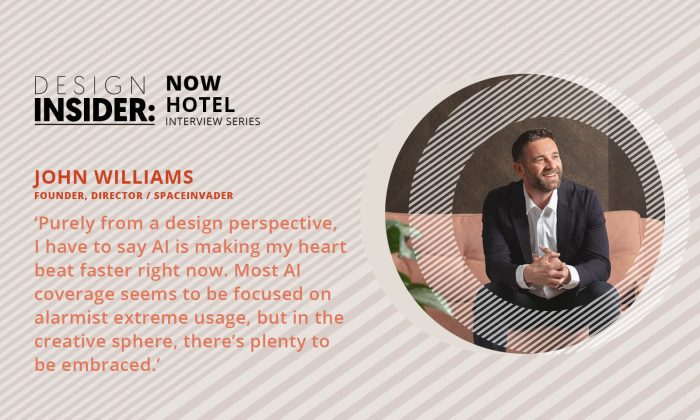Now Hotel Interview Series: John Williams
Although over recent years it has not been a smooth journey for the hospitality sector there is much to celebrate!
There are new design and operational concepts being thoughtfully explored which deliver experiences requested by hotel guests and there are initiatives which progressively address sustainability, employee wellbeing and the integration of new technology.
This series of interviews aims to paint a clear picture of where the hotel sector is now and goes on to highlight which conversations are leading in this commercial sector, before looking at what the future may hold. We finish by learning a little more about what excites our interviewees when working in this often challenging sector.
We sat down with our Ambassador John Williams to gather a clear insight into the hospitality sector from the viewpoint of a leading commercial interior designer.
Enjoy the full Now Hotel Interview Series here

Please could you introduce yourself and your role?
My name is John Williams and I’m the Founder and Director of interior design consultancy SpaceInvader. We’re based in Manchester and work across a number of sectors, from workplace strategy and design to amenity space design for the BTR sector to retail and, increasingly, hospitality.
We began in this sector more on the F&B side, designing bars and restaurants, and we’re still active in this area, with a swathe of sporting hospitality projects for Manchester City FC, as well as restaurants for Eller Leisure. We quickly also moved across into hotels, from working on the refurbishment of historic buildings, such as Wildes in Chester and Bruntwood Park in Cheadle to contemporary lifestyle brands, such as Tribe, for whom we’ve created designs for three hotels in the UK and Europe. We’re working currently on a number of boutique hotels, as well as ongoing projects for brands such as Hampton by Hilton.
Within the hospitality sector what is the key thing that we can celebrate right now?
For me, some of the most exciting work is happening at the top end of the mid-level lifestyle sector right now. In a way, both the luxury and value sectors have a degree of constraint in terms of both customer and operator expectation, whilst the lifestyle sector is very receptive to – and a showcase for – contemporary thinking.
For the younger generation on their travels, a great lifestyle hotel at accessible prices is a door opener and a great way to experience their first taster of a city’s food, design, art and culture. The evolution I’m particularly enjoying is the integration of locality into the offers of these hotels, from local artisan brewers to florists selling flowers in the lobby. This flexing of guidelines shows brands that are sensitive to the community and context they’re operating in. This social awareness is a sustainability issue too.
What are the hurdles which are currently stalling the hotel and/or hospitality sector’s growth?
There are unfortunately a lot of project delays right now in this sector, particularly in the UK. Developers are on the receiving end of a lot of extra conditions from banks, particularly as construction budgets are so variable, due to increased material and energy costs, arising both from the pandemic and the war in Ukraine. The restriction of movement in the labour force, meanwhile, is still a post-Brexit issue for hotels in terms of day-to-day operations.
What are the most important conversations being had in the sector?
I’m delighted to say that they’re around sustainability and wellbeing. These are concerns that have penetrated really deeply into the industry and it’s all the better for it. We’re seeing this at all levels of hotels, by the way, which is great, looking at everything from the consumption and re-use of water to end of life scenarios for all products and stricter embedded carbon targets.
We really welcome this, as well as the serious focus on wellbeing. We spend – and have spent in recent times – such huge amounts of time in our homes and at work, that our leisure time is increasingly important for our mental health – not only for relaxation but for stimulation. That sense of breaking out and breaking away that we all need. The sensual plays a hotel can offer, from food and drink to spas and treatments and the provision of art, colour and culture.
Who are the people currently making waves in this sector?
The Lore Group is always doing interesting things from a regeneration point of view. Their choice of buildings also naturally opens doors for good design narratives.
In design terms, I love to see the hotel sector’s infinite capacity for the interplay of art, texture, light, colour and form. Spanish designer Jaime Hayon’s Battersea art’otel is a particularly good recent example.
What is on the horizon for the hospitality sector which makes your heart beat faster?
Purely from a design perspective, I have to say AI is making my heart beat faster right now. Most AI coverage seems to be focused on alarmist extreme usage, but in the creative sphere, there’s plenty to be embraced. As we design a concept and investigate and research a ton of different avenues, we’re finding AI can often suggest something unexpected or even a totally new dimension. The concept starts with us, the client and the end-user, always, but as a conjoined creative-technical tool we’re finding AI very exciting indeed.




